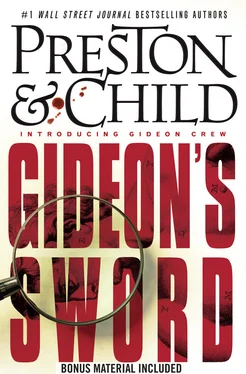He’d hit a dead end — or so it seemed. What now?
His growling stomach reminded him it was high time to put something in there besides coffee. Something good. He picked up the phone, dialed room service, and put in an order for two dozen raw oysters on the half shell.
The police junkyard was located on the Harlem River in the South Bronx, in the shadow of the Willis Avenue Bridge. Gideon stepped out of the cab to find himself in a bleak zone of warehouses, and industrial lots stacked with old railroad cars, abandoned school buses, and rusting containers. A smell of muck and dead clams came drifting off the river, and the white-noise of evening rush-hour traffic on the Major Deegan Expressway hummed in the air like a hive of bees. He’d lived in a neighborhood not much different from this — the last in a succession of increasingly squalid homes he’d shared with his mother. Even the smell was familiar. It was an intensely depressing thought.
A chain-link fence topped with concertina wire surrounded the facility, fronted by a rolling gate on wheels next to a guardhouse. Beyond the fence sat an almost empty parking lot fringed by dying sumacs, behind which squatted a long warehouse. Beyond that and to the right lay an open-air junkyard of stacked and pancaked cars.
Gideon strolled up to the guardhouse. A swarthy-looking cop sat behind the plastic windows, reading a book. As Gideon approached, he slid open the street-side window with a hammy arm covered with gorilla hair. “Yeah?”
“Hi,” said Gideon. “I was wondering if you could help me?”
“What?” The cop still had his nose in the book. Gideon shifted to see the cover: he was surprised to see it was City of God by Saint Augustine.
“Well,” said Gideon, putting on his most fawning, obsequious tone, “I’m so sorry to bother you.”
“No bother,” said the cop, finally putting down the book.
Gideon was relieved to see that, despite the beetling Neanderthal brows and heavy five o’clock shadow, the man had a friendly, open face. “My brother-in-law,” Gideon began, “Tony Martinelli, he’s the cabbie that was killed in that accident last night. The one where a guy ran him off the road on a Hundred Sixteenth Street—you read about that?”
Now the cop was interested. “Of course. Worst traffic accident in years — it was all over the news. He was your brother-in-law? I’m sorry.”
“My sister’s really broken up about it. It’s just terrible — got two babies at home, one and three, no money, big mortgage on the house.”
“That’s really tough,” said the cop, laying the book aside and appearing genuinely concerned.
Gideon took a handkerchief from his pocket, mopped his brow. “Well,” he said, “here’s the thing. He had a religious medallion hanging from the rearview mirror. It was a beautiful one, sterling silver, owned it forever. Saint Christopher.”
The cop nodded in understanding.
“Tony went to Italy, the Jubilee Year in 2000—and the pope blessed that medallion. Blessed it personally. I don’t know if you’re Catholic, but Saint Christopher’s the patron saint of travelers, and he being a cabbie and all — well, that medallion was the most precious thing he owned. That moment with the pope was the high point of his life.”
“I’m Catholic,” said the cop. “I know all about it.”
“That’s good, I’m glad you understand. I don’t know if you can do this or not, and I wouldn’t want to get you into trouble—but it would mean so much to his widow if she could have that medallion back. To, you know, put in the casket and bury it with her husband. It would give her such comfort to be able to do that…” His voice cracked. “Excuse me,” he said, fumbling out a kerchief he had bought for that purpose, blowing his nose.
The officer shifted uncomfortably. “I understand what you’re saying. I feel for her and her kids, I really do. But here’s the thing.”
Gideon waited patiently.
“Here’s the thing,” the cop repeated uneasily, seeking a way to say it. “The wrecked car is evidence in a homicide investigation. It’s locked up right now, nobody can even get to it.”
“Locked up?”
“Yeah. Inside an evidence cage in there.” He jerked a thumb toward the warehouse.
“But surely someone could just go in there and get the medallion off the mirror? That’s not evidence.”
“I understand. I really do. But that taxicab’s totally locked up. It’s in a chain-link cage, with a chain-link roof over it and everything. And the warehouse itself is locked and alarmed. You’ve got to understand, chain of custody for evidence is crucial in a case like this. The cab is evidence: there are scratches on it, paint from the other vehicle, evidence of ramming. This is a major homicide case — seven people died in that accident and others were badly injured. And they’re still looking for the scumbag who did it. Nobody can get in there except authorized personnel, and even then only by filling out forms and going through red tape. And everything they do to the car has to be videotaped. It’s for a good reason, to help us catch those responsible and make sure they’re convicted.”
Gideon’s face fell. “I see. That’s too bad, it would mean so much.” He looked up, brightening, as with a new idea. “Tony won’t be buried for a week or two, at least. Will it be locked up very long?”
“The way these things work, that cab will be locked up until the guys are caught, there’s a trial, maybe an appeal…It could be years. I wish it wasn’t like that.” The officer spread his hands. “Years.”
“What am I going to tell my sister? You say the warehouse is alarmed?”
“Alarmed and guarded, twenty-four seven. And even if you could get in there, as I said, the vehicle’s locked inside an evidence cage way in the back and not even the guard has a key.”
Gideon rubbed his chin. “Chain-link cage?”
“Yeah, sort of like those cages they use in Guantánamo.”
“The cage is also alarmed?”
“No.”
“How’s the warehouse alarmed?”
“Doors and windows.”
“Motion sensors? Lasers?”
“Nah, there’s a guard who makes his rounds every half hour in there. I think it’s just the doors and windows that have alarms.”
“Video cameras?”
“Yeah, they’re all over. The whole area’s covered.” He paused, his face becoming serious. “Don’t even think about it.”
Gideon shook his head. “You’re right. What the hell am I thinking?”
“Be patient. Eventually you’ll get that medallion back, and maybe by then you’ll have the satisfaction of seeing the perp doing twenty-five to life at Rikers Island.”
“I hope they fry the bastard.”
The cop reached out and laid a hammy hand on Gideon’s. “I’m very sorry for your loss.”
Gideon nodded quickly, pressed the cop’s hand, and walked off. When he reached the end of the block, he turned and looked back. He could see, under the eaves of the warehouse’s corners, a cluster of surveillance cameras providing full coverage of the outdoor area. He counted them: twelve from this vantage point alone. There would be many more on the other side of the building and an equal number within.
He turned and pondered what he’d learned. The fact was, most of what people called security systems were pastiches, just a lot of expensive electronic shit slapped up willy-nilly with no thought to building a coordinated, comprehensive network. One of Gideon’s worst habits, which ruined his enjoyment of museum-going, was his propensity to figure out how many ways he could rip the museum off: wireless transmitters, vibration and motion sensors, noncontact IR detectors, ultrasound — it was all so obvious.
Читать дальше












